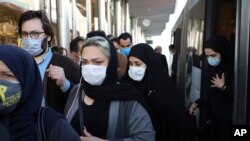For the second day in a row, Iran announced on Monday its highest single-day death toll from the coronavirus with 272 people confirmed dead.
The announcement by Health Ministry spokeswoman Sima Sadat Lari saw Iran also give its single-day highest count of new cases with 4,206 new patients.
Iran has seen the worst outbreak in the Middle East, with more than 500,000 confirmed cases. It has recorded over 28,800 deaths and 409,000 recoveries. The situation in the capital, Tehran, has worsened, prompting officials to tighten restrictions earlier this month, shutting down universities, schools, libraries, mosques, cinemas, museums and beauty salons. On Saturday, the government ordered all Tehran residents to wear face masks outdoors and in public places, and warned violators would be fined. As infections surged, Cabinet spokesman Ali Rabiei promised that those who tested positive would be closely tracked.
Iran has struggled to contain the spread of the virus across this nation of 80 million people, initially beating it somewhat back with movement restrictions in May only to see it return beginning in June. Over recent weeks, Iran has seen daily death tolls spike to their highest-ever levels, sparking increasing concern even as government officials continue to resist a total lockdown for fear of cratering its sanctions-hit economy.
The virus has spread to highest levels of the government. Among those recently infected is the head of the country's atomic energy organization and the country's vice president in charge of budget and planning. A number of Cabinet ministers also have tested positive, as well as top officials including senior Vice President Eshaq Jahangiri and Vice President Massoumeh Ebtekar.
The head of an Iranian government task force on the coronavirus who had urged the public not to overreact about its spread was among the first officials to contract the virus in late February.
The virus first appeared in Iran at the same time the government was trying to shore up support for the country's parliamentary elections, which saw the lowest voter turnout since the 1979 Islamic Revolution that brought its clerical leadership to power.
As the death toll reached new heights, the nation's currency plunged to its lowest level ever on Sunday, following the Trump administration's decision on Thursday to blacklist 18 Iranian banks that had so far escaped the bulk of re-imposed American sanctions. The economy has struggled under U.S. sanctions after America's unilateral withdrawal in 2018 from Tehran's nuclear deal with world powers.
Iran Has Highest Daily Virus Death Toll, New Patient Count




